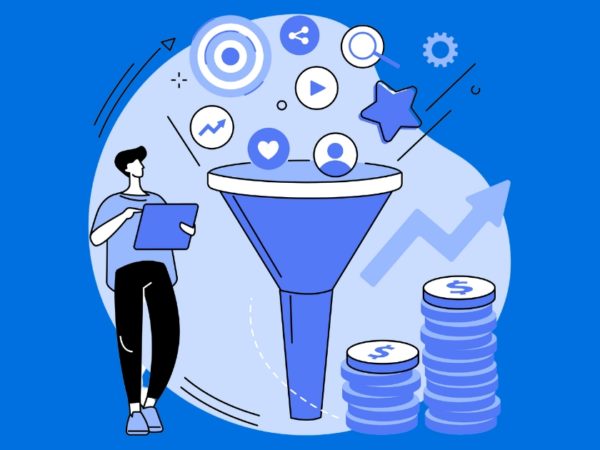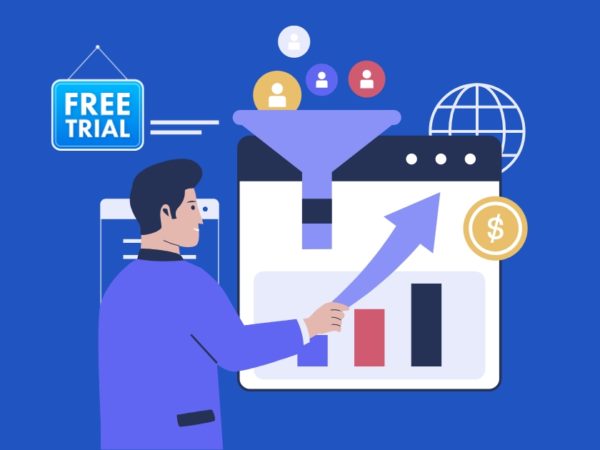Customer Relationship Management (CRM) is a technique to manage customer interaction throughout their entire relationship with a business.
The CRM philosophy is simple – put yourself in your customer’s shoes and study everything there is about them.
Businesses have nowadays started leveraging AI to support their CRM platforms.
Today, AI-based CRMs facilitate organizations to make better data-driven decisions by analyzing real-time customer information. And this has revolutionized the way sales work.
In this article, we’ll explore all about AI-powered CRMs – the benefits, the bottlenecks, and the best CRMs you can use to set your sales on fire.
What Are AI-Based CRMs?
AI-based CRMs are a series of AI-driven processes centralized in a way to help you manage tens and thousands of customers efficiently.
At its core, these CRMs work on four notable principles:
#1. Machine Learning
Machine Learning (ML) is a cutting-edge technique widely used in commercial AI. It involves training AI to behave efficiently under changing conditions by intensely monitoring the patterns and trends over time rather than rigid and coded instructions.
#2. Predictive Analysis
The need of the hour, predictive analysis helps with enterprise planning and customer interactions. It empowers organizations to make data-driven decisions, forecast sales, and allocate resources effectively at all levels.
#3. Automation
AI-based CRMs – the term itself has AI (artificial intelligence), making automation an integral part of the overall process. Automation, at its best, increases the ability of the CRM to perform certain tasks with greater speed and accuracy than humans. With the help of AI advancements, even complex workflows can be automated and done effortlessly.
#4. Sentiment Analysis
The best part of any AI-powered CRMs is its ability to capture, analyze, and visualize how customers perceive products and services.
It enables customer service and sales agents to identify customer emotions, including satisfaction and frustration, across different communication channels such as phone, live chat, email, and social media.
Apart from these, AI-powered CRMs involve several other pieces that add to improving your overall customer engagement.
Let’s take a look at them.
How AI-Based CRMs Can Improve Customer Engagement
A Harvard Business Review article titled ‘How AI Is Changing Sales‘ states that AI algorithms can influence five core areas of sales:
- Competitive Pricing
- Forecasting
- Upselling & cross-selling
- Lead scoring
- Performance management
Combining AI and Customer Relationship Management software can provide comprehensive information on all these parameters and result in a higher number of closes.
That said, here’s how AI-powered CRMs leverage Natural Language Processing to 10x your customer engagements.
#1. Personalization
AI-based CRMs can help businesses personalize customer interactions by analyzing customer data such as past purchase history, browsing behavior, and demographics.
This data can then be used to tailor marketing messages, product recommendations, and customer support interactions to each customer’s unique needs and preferences.
#2. Chatbots
AI-based CRMs use chatbots to provide instant customer support and improve response times. Chatbots can answer frequently asked questions, provide product recommendations, and even process simple transactions.
As a result, speeding up the process and freeing human agents to focus on more complex issues.
#3. Omnichannel Support
AI-powered CRMs can provide seamless customer support across multiple channels, such as email, social media, chat, and phone. This lets customers interact with businesses on their preferred channel, improving engagement and satisfaction.
To summarize our point, AI-enabled CRM software can determine a customer’s emotional state through their text-based or voice-based words, tone, and conversation pattern. Thereby allowing you to create tailor-made experiences and interactions for customers.
Benefits of Integrating AI In CRM
Improve Efficiency
Only a few know that AI, when integrated with traditional CRM software, transforms into your all-in-one virtual assistant.
It can help you manage calendars, plan meetings, make phone calls, do follow-ups, and aid in every typical manual task.
This frees up sales and customer service executives’ time which they can use to focus on high-value tasks, such as building customer relationships and optimizing their funnel.
Helps In Customer Segmentation
Another benefit of AI-powered CRMs is that this software eases the process of segmenting your hefty-customer data into defined categories.
For example, manually segmenting your customers could be challenging based on demographics, behavior, likes, dislikes, etc. However, the powerful algorithms of AI-powered CRMs help you do it effortlessly.
How does it help?
First, it automates the process, and so your team doesn’t have to do the process manually.
Secondly, since now your customers are segmented within a click, you can easily create personalized messages or experiences for potential customers. You see, the more targeted your marketing is, the more leads you get.
Simplify Lead Management
On average, a business generates thousands of leads each month. From this, only a few hundred will convert into sales.
But that too if you engage and follow up with each with the same energy.
As the volume of leads grows, it becomes challenging to shift through them manually. And you can’t ignore leads because every lost opportunity means lost business.
Tricky situation, isn’t it?
By combining AI and CRM platforms, businesses can create a lead-generation powerhouse.
This unstoppable duo allows for increased output without compromising the quality of interaction. The result is a revolutionized approach to engaging, nurturing, qualifying, and following up with leads.
Close More Deals
A core benefit of AI-powered CRMs is the ability to analyze and identify the leaks in the sales pipeline.
For example, in a sales scenario with a 50-50 chance of deal acceptance or rejection, AI-based CRMs provide actionable insights and make intelligent recommendations to advise sales reps on the next best steps to close a deal.
Its algorithms are built to identify buyers’ intent (strong, mild, weak) to purchase the product or service and provide them with the right resources to make a decision.
In time-sensitive situations where you need to address potential leads instantly, AI-powered CRMs do the research, provide insights, analyze customer sentiments, and present you with an instant report on possible ways to close a particular deal.
Drawbacks of AI-Based CRMs
Data Biased
AI-powered CRMs feed on the data collected through various channels and campaigns. And the AI algorithms are only as good as the data they are trained on. The algorithm may produce inaccurate or unfair results if the data is biased or incomplete.
Lack of Human Interaction
While AI-powered automation can save time and reduce costs, it can also lead to a lack of human interaction with customers, which may negatively impact the customer experience.
Food for thought: When you try explaining a major issue to the chatbot, all it can present is a few options or generic answers fed into the system.
Fortunately, companies do recognize this drawback, and most provide you with an alternative to talk to an actual sales rep instead of continuing the awkward conversation with the chatbot.
CyberSecurity Risks
Where there’s AI, there’s a risk of a data breach or cyberattack.
AI-powered CRMs may be vulnerable to cyber attacks, and businesses must take extra precautions to protect sensitive customer data.
For the most part, CyberSecurity is one of the prominent reasons why companies don’t integrate their traditional CRMs with AI.
Despite the drawbacks, some well-known companies have earned millions by leveraging AI-powered CRMs.
Top Brands That Leverage AI-Powered CRMs
According to the 2020 marketing leadership benchmark report, marketing leaders leverage AI to improve customer segmentation and lookalike audience modeling.
Let’s understand how companies leverage AI-powered CRMs with the help of some use cases.
#1. Coca-Cola
Coca-Cola is one of the largest beverage companies in the world, with a vast customer base.
In order to better serve its customers and improve its marketing efforts, Coca-Cola implemented an AI-powered CRM system.
This system allowed them to track customer behavior and preferences, which later helped them create targeted marketing campaigns that were more likely to resonate with their audience.
The system also enabled them to identify areas where they could improve their customer service, leading to increased customer satisfaction.
#2. Salesforce
Salesforce is a leading provider of CRM software, and they have integrated AI into their platform to provide even more value to their customers.
Salesforce’s Einstein AI uses natural language processing and machine learning algorithms to help sales teams better understand their customers and identify new opportunities. This has helped companies to increase sales and improve customer satisfaction.
#3. Cogito
Cogito leverages AI-powered CRMs to provide real-time conversational analysis. It evaluates customer emotions, how effective the calls are, and how best to respond to them.
According to the company, understanding customers’ emotional states helps businesses increase their revenue per customer by 10%.
AI-Powered CRMs
Now that you know all about AI-powered CRMs, it’s time to see some SaaS in this sector.
#1. Freddy AI
Freddy AI by Freshworks is an AI-powered CRM tool designed to automate sales, marketing, and customer support processes for businesses of all sizes.
Its automation features include chatbots, predictive lead scoring, and intelligent workflows, which streamline and simplify various CRM tasks.
Additionally, Freddy AI offers customizable dashboards and reports, allowing businesses to track and measure their sales and customer service performance in real-time.
The platform also integrates with other tools such as Freshdesk, Freshsales, and Google Analytics, providing users with a comprehensive view of their customer data.
#2. C3 AI
C3 AI CRM is a next-generation customer relationship management platform that harnesses the power of artificial intelligence to drive business growth. The tool offers a unified view of customer data, enabling businesses to gain a 360-degree understanding of their customers.
It delivers a 97% revenue forecast accuracy for the business and for each rep, team, and geography.
Moreover, the platform lets you use AI to identify, prioritize, and accelerate the right deals. What’s more, the platform has a dedicated mobile app, allowing you to track performance and conversions on the go.
#3. Kreato CRM
Kreato CRM is a cloud-based customer relationship management platform designed for small to mid-sized businesses. The platform is powered by built-in Sales Acceleration AI – Axlerate.
At its best, Axlerate with KreatoCRM helps you with lead scoring, sales forecasting, activity capture, engagement recommendations, team performance insights, and much more.
Additionally, Kreato CRM’s user-friendly interface and customizable dashboards make it easy for businesses to manage their customer data and track their performance in real-time.
#4. PSXDigital CRM
PSXDigital provides an AI-powered CRM solution to help automate your sales and marketing activities. The platform is highly customizable, making it easily indulge with the needs of any organization in any industry.
The CXMAi platform integrates PSX Digital with your existing CRM software, enabling you to perform an in-depth analysis of customer data on the go.
The platform easily pulls data from multiple customer, market, and historical sources and presents insights under a single view with minimum manual entry, helping you make smarter decisions and meet customer expectations faster.
Wrapping Up
Organizations often question the combination of CRMs with AI. They find it as a fancy add-on, which they think is unnecessary and has zero value. Simply put, they feel CRMs are self-sufficient to streamline the sales process. But little do they know, this duo has revolutionized the outlook of sales and marketing in today’s era.
You may also be interested in the best cloud CRM solutions.
![Kirelos Blog How AI-Powered CRMs Are Revolutionizing Sales [2023] How AI-Powered CRMs Are Revolutionizing Sales [2023] CRM Sales & Marketing](https://kirelos.com/wp-content/uploads/2023/03/24230/how-ai-powered-crms-are-revolutionizing-sales-2023-950x385.png)


